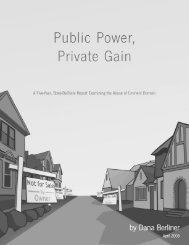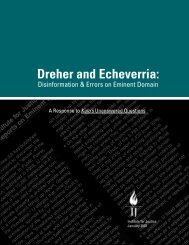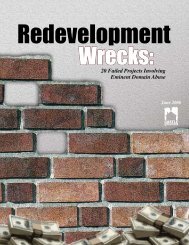50 State Report Card - The Castle Coalition
50 State Report Card - The Castle Coalition
50 State Report Card - The Castle Coalition
- No tags were found...
Create successful ePaper yourself
Turn your PDF publications into a flip-book with our unique Google optimized e-Paper software.
<strong>50</strong>statereport card<strong>Castle</strong> <strong>Coalition</strong>LEGISLATION REPORT CARD<strong>State</strong>:California• No meaningful reform was seriously considered.• <strong>The</strong> state’s abusive redevelopment statut continue to leave allproperty owners at risk.Inc.As citizens of an environmentally consciousstate, Californians will be disappointed to knowthat the five eminent domain bills signed intolaw in 2006 were basically a waste of paper. Ina state where thousands of properties havebeen threatened and/or condemned in the lastdecade, these bills scarcely hinder the rampantabuse of eminent domain.California is the home state ofCongresswoman Maxine Waters, one thechampions of eminent domain reform at thefederal level, yet the <strong>State</strong> Assembly dismissedmore robust and permanent protections forprivate property rights and instead passed apackage of five bills that do very little to ensurethat citizens’ homes and businesses are safefrom tax-hungry government officials andland-hungry developers. Senate Bills 53, 1206,1210, 16<strong>50</strong>, and 1809 create a few additionalprocedural hoops for condemning authoritiesto jump through, such as requiring more detailsabout the proposed use of the targeted propertyand additional findings of blight when renewinga blight designation. <strong>The</strong>se bills are mostlycosmetic and will not prevent determinedofficials from taking private property for anotherprivate party’s benefit.Senate Bill 1206 came the closest tosubstantive reform by trying to addressCalifornia’s broad definition of blight, but itfailed to make any significant changes. <strong>The</strong>state’s redevelopment statutes still leave almostany property at risk of condemnation. IfCalifornians’ properties are truly going to beprotected, the Legislature must ensure thatproperties may be taken only if they are animmediate threat to public health and safety,and that this assessment must be made on aproperty-by-property basis.In November 2006, Californiansconsidered Proposition 90, a ballot initiativethat, if passed, would have addressed propertyrights protections in the state constitution.Unfortunately, even that proposed amendmentlacked the strong public use language necessaryto ensure the security of homes, businesses,farms, and houses of worship. Probably becauseof a highly controversial provision on regulatorytakings, the measure narrowly failed.Senate Bills 53, 1206, and 16<strong>50</strong>Sponsored by: <strong>State</strong> Senator Christine KehoeSenate Bill 1210Sponsored by: <strong>State</strong> Senator Tom TorlaksonSenate Bill 1809Sponsored by: <strong>State</strong> Senator Michael MachadoStatus: All signed into law on September 29, 2006.9





